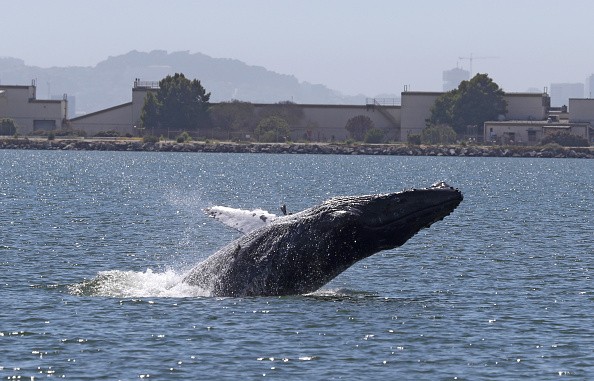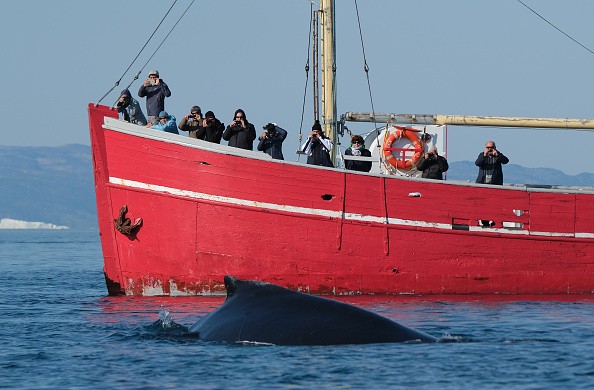Onboard a tiny whale-watching boat navigating the turbulent seas of Faxaflói Bay off Iceland's southwest coast, a guide encourages guests not to eat whale flesh.
Estelle, pointing out whales and dolphins from the boat, says there is a campaign here against whaling. "Meeting them in person is preferable to eating them."

Iceland's Decision to Stop Commercial Whaling
Iceland, one of the few nations globally that commercially kill whales, said in February that the practice will be phased out by 2024, but it has not yet been legally outlawed.
The decision was driven by falling demand for whale meat, especially after Japan began commercial whaling in 2019. "There is scant indication that this practice has any economic benefit," the country's fisheries minister, Svandís Svavarsdóttir, wrote in the publication Morgunblaðið. However, analysts attribute a 15-year campaign led mostly by Icelanders and local whale-watching firms.
Whaling in Iceland
Whaling has been done in Iceland since the early 1600s. Still, it wasn't until the 19th century that steamships and explosive harpoons permitted American and European businesses to hunt the creatures considerably.
Under the worldwide embargo on commercial hunts, Iceland discontinued commercial whaling in 1985 and researched whaling four years later. Commercial whaling, however, resumed in 2006. Annual limits now allow for the slaughter of 209 fin whales in Iceland for export to Japan and the slaughter of 217 minke whales for local consumption.
Since the practice resurfaced, a coalition of local whale-watching firms has pushed to end it, led by the non-profits International Fund for Animal Welfare (IFAW) and IceWhale. With the motto "meet us, don't eat us," their campaign intended to change Iceland's tide against whale hunting.
Whale Tourism
Whale is not regarded as a delicacy among Icelanders, contrary to popular belief, says Arni Finnsson, chair of the Iceland Nature Conservation Association, who worked on the campaign. According to IFAW, just 2% of Icelanders eat it regularly.
Instead, the country's nearly 2 million yearly visitors, many of whom assume it is an Icelandic specialty, have become the greatest minke whale eaters. Megan Whittaker, the chief naturalist at Elding, a whale-watching organization, adds, "We had people who would witness whales and then ask where they could go and eat them."
IFAW and IceWhale devised a strategy to put an end to the practice. IWAF started one of the country's most successful petitions in 2009, urging people to sign a declaration that they would not eat whale meat, which has already gathered about 175,000 signatures.
Since 2011, the campaign has sent volunteers into restaurants to persuade them to cease feeding the animal, and over 60 eateries have been designated as "whale friendly." According to IFAW, which conducts regular tourist surveys, the campaign reduced whale meat consumption by visitors in Iceland by three-quarters.
Meet Us, Don't Eat Us

According to Belén García Ovide, founder of Ocean Missions, an Icelandic non-profit not engaged in the campaign, "Meet us, don't eat us" has significantly impacted the government's stance on whaling. "[Politicians] have realized that a living whale provides greater economic advantages than a dead whale," she explains.
Whale watching has grown in popularity. According to the Animal Fund, one out of every five visitors in Iceland goes whale-watching, bringing in about $12 million (£9 million).
The movement to halt whaling has significantly benefited from the efforts of tour firms. Gísli ólafsson, proprietor of Lakitours in Iceland's Westfjords, adds, "All whale-watching enterprises have been like propaganda." He claims that his tour guides have talked about whaling on every trip for decades.
The fisheries minister said in 2017 that the "no whaling zone" will be increased, sending hunters further out to sea, where there are fewer whales, making the sport commercially unviable.
Demand for Icelandic whales fell after Japan started commercial whaling in 2019. During the epidemic, whale meat processing factories were also unable to function normally.
Conservationists are now researching whale tourism. Whale-watching firms have agreed to follow a code of behavior that includes not making loud noises, approaching animals slowly, and taking turns with other boats.
However, unlike in other whale-watching sites like New Zealand or Canada, there is no legal necessity to obey this voluntary rule. Ovide wants lawmakers to do something about it.
Scientific Tests
Scientists test cortisol levels and observe behavior to see if whales are agitated by tourist vessels. According to Tom Grove, co-founder of Whale Wise, the research conducted in collaboration with Edinburgh University and the University of Iceland might lead to modifications to the present code of conduct.
Some people are still opposed to the proposal to abolish whaling. Owner of Hvalur, a family enterprise that has spearheaded the hunt for fin whales for decades, Kristján Loftsson told the Guardian that he intends to continue as long as it is allowed.
For the first time in four years, he has announced that he would resume whaling for four months this summer, with up to 150 people anticipated to be employed to work on whaling ships.
In recent years, public support for whaling has dwindled. However, for the time being, whale-killing vessels continue to float alongside whale-watching boats in Reykjavik port.
Read also: Gloom Reality: Even the Most Daring Technologies Can No Longer Reverse Impacts of Climate Change
For similar news, don't forget to follow Nature World News!
© 2025 NatureWorldNews.com All rights reserved. Do not reproduce without permission.





